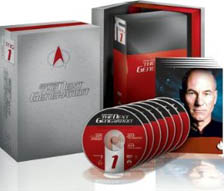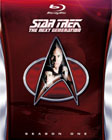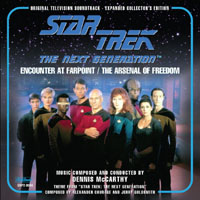Encounter at Farpoint
|
|
(Star Trek - The Next Generation story no. 1)
(episode production codes 101 & 102)
written by D.C. Fontana and Gene Roddenberry
directed by Corey Allen
|
Ahh, the Next Generation. My favourite Star Trek crew and series.
As much as I love The Original Series (TOS) and crew,
I enjoy the characters and series of "The Next Generation" (TNG)
even more, and they have become my favourites in the
Star Trek franchise.
Some have said that "The Next Generation" also has its own
"big three" amongst the cast, a trio that is comparable
to the Kirk-Spock-McCoy triad that dominated old Star Trek.
I don't see that. To me, the cast chemistry
between Shatner, Nimoy, and Kelley was very unique
and unparalleled in any of the spinoffs.
And the real question for the Next Generation is,
exactly which three cast members would be the "big ones"?
In my mind, this series made ALL of its main cast members "big",
refusing to side-line any of them the way that Scotty and Chekov
rarely rose above comic foils, or the way Sulu and Uhura most
often got left behind in the background. The endless ability
of Next Generation stories to rotate main character status between
all cast members ensured that they all became important and big.
Also, while Kirk is a great Captain, I enjoy Picard more,
and not least because Patrick Stewart is such a fine actor
bringing great power and dignity to the top of the show.
Under his command, one can truly believe that high philosophies
are being lived, rather than simply romped through. Excellent.
Mind you, the characters are still quite rough in this pilot story.
As scripted, Picard still seems slightly off, although
one can feel Stewart's performance tugging it into the correct
direction and adding some extra dimension and colour. Typically,
whenever the characters can distance themselves from the awkward moments
scripted for them and focus on their jobs, things fall into place
and we see the characters we'll grow to love over the next 7 years.
Riker nicely exudes the charisma around which the crew's team spirit
will gel, while Data seems poised to become the emotionless
outsider to the human condition who can best articulate
its exploration to the audience as he grasps each new idea
in wonderment. Just to be sure you don't miss that fact,
DeForest Kelley is imported to the story for a cameo
to make the comparison between Data and Spock obvious.
But the best addition to this crew may be the character of
Deanna Troi, who can tune in to the emotions of those around her
at will. This is a nice reflection of the New Age movement that
was gaining strength in the world at the time of production,
and is an ability that ALL of us humans can learn as well.
In hindsight, it is most bizarre that Troi's abilities are not
reflected in any other crew of the other spinoffs in the Star Trek
franchise, although we might be able to put that down to the writing
team that later solidified for the spinoffs not really knowing how
to use those abilities, and anthropomorphizing too many alien species
until they became just humans with weird make-ups, thus robbing
Troi's character of one of her more obvious purposes in helping
form bridges between examples of Roddenberry's
"Infinite Diversity in Infinite Combinations".
But the addition of her unique perspectives to the
decision-making command structure of this crew, particularly
in its early explorative phases, really helped elevate
this crew above the others, as is aptly demonstrated in this
adventure. Q rightly praises her when she nearly puts the entire
puzzle together herself in part 2. Insisting on a Next-Gen "big three"?
Look who's sitting in the three chairs at the Captain's position
on the bridge....
So, if The Next Generation is the version of Star Trek that arguably has
the best total line-up of regular characters and actors...
but this pilot adventure wasn't a great vehicle for showcasing those
characters, what strengths should we expect here?
I think, as William Shatner has said, even when actors are having an off day,
a grand concept can carry a show. "Encounter at Farpoint"
showcases many concepts and philosophies that are particularly grand,
while coming with some of the best
razzama-tazz eye-candy television could produce in 1987 - a combination so good
that this pilot story can still rank as one of the top three of all Star Trek pilots
we know today. And indeed, I'd be hard pressed to find any other first season adventure
of Star Trek TNG that gives as good a ride as this one, or which I enjoy more than this one.
"Farpoint" is still a big, big winner in my book.
Patrick Stewart does have his moments to shine in this first story
as Captain Picard - ultimately my favourite character of all the Trek Captains
with leading roles. It is when he is on the bridge in command of his
crew during a crisis that he most resembles the character he will play throughout
the series - and indeed the character that will inspire the audience's
confidence in him to lead the way out of whatever bizarre situations
present themselves in continuing adventures.
His more personal moments with individual members of the crew are much more
awkward, and not quite yet finding the right tone. Perhaps the script was
trying a bit too hard to show awkwardness and strangeness at every turn.
His interactions with Q are perhaps the strangest of all. Though there is
a worthy issue for them to debate, which they tackle successfully, the extremities
of their main conflict feel forced and inorganic, going off-tangent at many points
in ways that produce scenes of questionable quality and interest to the audience.
Q's main motivation is also difficult to really pin down, at least as long as we
look at him as an external antagonistic force. Is he really keen to stop Humanity
from exceeding a certain boundary, to see them fail? In particular, I look at
his goading at the end of the story as being one of the key factors ensuring
that Picard and crew realize the truth and make philosophically better choices.
It's as though Q has decided that the best way to HELP humanity is
to play a mock antagonist, rather than a real one.
Indeed, it often seems the best way to make sense of the interaction between
Picard and Q is to think of Q as a manifestation of some part of Picard's own psyche,
a part which he has tried to repress, but without which, Picard is not quite complete.
Somehow, that theory seems to provide a context for the more bizarre ideas
that crop up, and help make them fit.
A lot of the rest of the cast still seem to be struggling to find their characters,
and there is a feeling that more rehearsal for the actors would have been of great
benefit, whereas special effects got a higher priority on this first story.
From a scripting point of view, perhaps Troi got too many scenes of highly negative
emotions to work through, from general worry, fear, and tension, to channeling
pain and anger, to reliving the memory of being jilted. Though she and Riker
generally hit the right note when they first come face-to-face in this one,
the director should have ensured that that note was a brief moment, and not
drawn out as if they were both headed for their own inevitable funerals.
Troi gets her due closer to the end of the story, where she has some much more
joyous and triumphant emotions to deliver. A bit more of that sprinkled
throughout the tale would have brought a greater balance to the story
and to helping the new cast gel with each other and with the audience.
One of the greater successes in this first story is the interaction between
Riker and Data, which hits a good note, and helps one want to see more of this
crew getting to know and work with each other.
|
Something that really only becomes noticeable from the
audio CD release of Dennis McCarthy's music for this story, is
the alternate main title he composed for the Next Generation series.
While I certainly don't prefer it over the Jerry Goldsmith theme
they eventually used, I think it is a pity that they didn't keep
it just for the pilot episode's titles, because....
McCarthy continues to
very successfully use variations of this theme all throughout his
music on this first story, and hearing the theme properly at the
beginning would help audience appreciation and give the whole
thing a greater sense of unity. And the saucer separation sequence
is a good opportunity to bring in Goldsmith's theme fairly early
to satisfy Next Generation fans who have become attached to it.
In fact, McCarthy continues to use variations on his alternate
theme throughout many of his later scores as well, so its
importance is not to be underestimated. I kind of like it,
especially in its gentler renditions during the episodes.
|
|
|
This does turn out to be a finely crafted story in the end.
Although the opening sequences with "Q" seem a bit stiff and aren't
yet finding exactly the right tone, Q's presence in the story
pays off enormously as he applies much dramatic pressure on the
emerging new Starfleet crew to be at their philosophical best during
the adventure at Farpoint. And by the time we reach the second half,
John de Lancie has found his characterization of Q,
and offers the much more brilliant style of playing this character
that one will find coming up more and more often
throughout the rest of Star Trek.
The mystery of Farpoint station also tends to work well. We get some
intriguing questions that keep us on the hook to learn more, while
there is breathing space for the two halves of the crew to meet
each other and get to know each other. And the mystery escalates well,
particularly when an unknown craft enters the system and increases
tensions. The story's drama begins to work particularly well after
this point.
With philosophy pushed so nicely to the forefront of the story,
of course the Prime Directive gains mention. Its application
is curious this time, because the Bandi civilization in
question is fully aware of its neighbours in space, and negotiating
agreements with Starfleet and the Federation. It is less about
proper awareness being given to a pre-warp society, and more
about defensive agreements with an adequately advanced,
but not-yet allied society. Thus the Prime Directive seems to have
acquired greater scope and complexity since Kirk's time,
and the thrust of the Picard-Q conflict here suggests that
humanity tested now in the 24th century will prove itself
far more noble than even during Kirk's time in the 23rd century.
Thus the Star Trek franchise earns some points here for allowing
itself to continue to grow.
Not many details come out, however, of what the Prime Directive
actually states, or how it may have developed in the intervening
years. Fair enough, since there is a whole new series starting
here, and one would want to leave room for further episodes to
fill in such gaps after they've been thought out a little more.
Good show.
Perhaps this pilot story does suffer a bit too much from
Gene Coon's philosophy of a violent instinct at Mankind's heart that
requires effort to overcome, as this story is riddled with examples
of that style of outburst being struggled with, and in retrospect feels
out-of-character for many of the regulars that we have since come to know
much better. And the plot often hinges on the most obvious reversal
of that instinct over and over again. But I think the payoff at the end
still makes the struggle worth it, as we get a concluding sequence
far more cinematic than most other dialogue-heavy episodes will manage,
a sequence as awe-inspiring as the best of
Carl Sagan's Cosmos episodes.
And that in itself is so powerful, I don't think any other season one
episode can come close to touching it.
"Encounter at Farpoint" is a milestone, and one of the better
and more enjoyable stories of the Next Generation's ground-breaking
first season. Don't miss it!
|
|









 (regular)
(regular)



